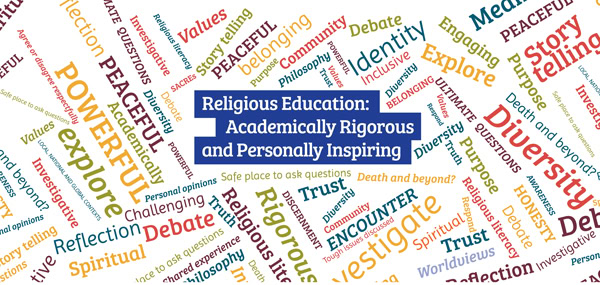About RE/RME/RVE in the UK
RE/RME/RVE contribute dynamically, in their differing educational contexts in the UK, to children and young people’s education in schools by provoking challenging questions about meaning and purpose in life, beliefs about God, ultimate reality, issues of right and wrong and what it means to be human. Children and young people learn about and religions and worldviews in local, national and global contexts, to discover, explore and consider different answers to these questions, developing an aptitude for dialogue so that they can participate positively in our society with its diverse religions and worldviews. Pupils should gain and deploy the skills needed to understand, interpret and evaluate texts, sources of wisdom and authority and other evidence.

NATRE provides support and resources for teachers in the UK and beyond. We are mindful that contexts vary widely across the UK nations. In England and Northern Ireland, our subject continues to be called Religious Education. In Scotland, it is called Religious and Moral Education and, in Wales, the name is Religion Values and Ethics (RVE). For ease of reference, we use RE on this website, unless in mention to the specific context(s) of Scotland and/or Wales.
England
Religious Education (RE) is a statutory subject and legally required for all registered pupils in state-funded schools, including those in academies and free schools.
The RE curriculum must reflect that the religious traditions in Great Britain are mainly Christian, while also taking into account the teachings and practices of the other principal religions represented in Great Britain.
Local authority-maintained schools follow a locally agreed syllabus, created by Standing Advisory Councils on Religious Education (SACREs).
Academies and Free Schools schools must provide RE in accordance with their funding agreements, often following a locally agreed syllabus or an alternative that meets the same requirements.
Parents have the right to withdraw their children from all or part of the RE curriculum.
Find out more:
Northern Ireland
Core Syllabus: RE is a compulsory part of the curriculum for all pupils in grant-aided schools.
The core syllabus, specified by the Department of Education, places a strong emphasis on Christianity, while also requiring the study of other world religions.
Parents can choose to withdraw their children from all or part of the RE curriculum.
Wales
Starting in 2022, Religion, Values and Ethics (RVE) replaces the RE in the Curriculum for Wales.
RVE aims to be more inclusive, covering a broader spectrum of religious and non-religious worldviews.
RVE must be taught with due regard to a locally agreed syllabus and is part of the Humanities Area of Learning and Experience.
From September 2023, the parental right of withdrawal from RVE is being phased out.
Find out more:
Scotland
Religious and Moral Education (RME) is part of the Scottish Curriculum for Excellence, covering both religious and non-religious perspectives.
RME is based around three Strands: The curriculum focuses on Christianity, other world religions, and personal search, which includes philosophical and moral education.
Schools have flexibility in how they deliver RME, often reflecting their local context and the diversity of their communities.
Parents can withdraw their children from RME classes.
Find out more:
A review of the performance of religious education
Explore this informative infographic on Religious Education in the UK, providing insights into the importance and benefits of religious education. NATRE offers comprehensive support and resources to help teachers and schools improve the quality of RE education. Discover how our organization can assist you in delivering a rich and engaging RE curriculum.
Withdrawal from RE
Pupils
Parents may withdraw their children from RE lessons or any part of the RE curriculum and the school has a duty to supervise them, though not to provide additional teaching or to incur extra cost. Where the pupil has been withdrawn, the law provides for alternative arrangements to be made for RE of the kind the parents want the pupil to receive. These arrangements will be made by the parents;- the school is not expected to make these arrangements. This RE could be provided at the school in question, or by another school in the locality. If neither approach is practicable, the pupil may receive external RE teaching as long as the withdrawal does not significantly impact on the child’s attendance. Schools should have a policy setting out their approach to provision and withdrawal.
It is good practice to insert a line about this in your school prospectus, such as: ‘RE is provided for all pupils, and is inclusive and broad minded. Parents do have the right to withdraw pupils from RE: if you wish to do this, make an appointment with the head teacher / RE subject leader. The school does not support selective withdrawal from RE’.
Teachers
Teachers may withdraw from the teaching of RE unless they have been specifically employed to teach or lead and manage RE. An application to withdraw must be given in writing to the head and chair of governors. Pupils must not miss out on RE teaching because a teacher has withdrawn from teaching RE. The school must make alternative provision for the pupils to be taught RE.
Religion and Worldviews
What is this approach?
You may have heard people in the Religious Education (RE) community talking about the worldviews approach in Religious Education.
On this page, you will find links to current research, resources and blogs from people sharing their thoughts on this approach. This might be described Better as ‘an education in religion and worldviews.
